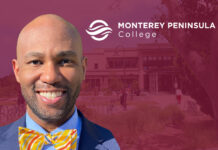 Melvin Oliver, professor of sociology and executive dean of the College of Letters and Science at the University of California at Santa Barbara, received the distinguished Career Award from the alumni of William Penn University in Oskaloosa, Iowa. Dr. Oliver is a 1972 graduate of William Penn University and went on to earn a master’s degree and a Ph.D. in sociology from Washington University in St. Louis.
Melvin Oliver, professor of sociology and executive dean of the College of Letters and Science at the University of California at Santa Barbara, received the distinguished Career Award from the alumni of William Penn University in Oskaloosa, Iowa. Dr. Oliver is a 1972 graduate of William Penn University and went on to earn a master’s degree and a Ph.D. in sociology from Washington University in St. Louis.
Dr. Oliver taught at the University of Missouri and the University of California at Los Angeles before serving as vice president for asset building and community development for the Ford Foundation. He joined the faculty at UCSB in 2004.
Professor Oliver is the co-author of the award-winning book Black Wealth/White Wealth: A New Perspective on Racial Inequality.








